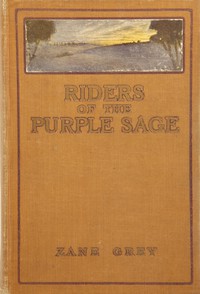The Desert of Wheat by Zane Grey (top 100 books to read .txt) 📖

- Author: Zane Grey
Book online «The Desert of Wheat by Zane Grey (top 100 books to read .txt) 📖». Author Zane Grey
Dorn lingered there, loath to leave. The great lesson of his life held vague connection in some way with this squad of French privates. But he could not pierce the veil. This meeting came as a climax to four months of momentous meetings with the best and the riffraff of many nations. Dorn had studied, talked, listened, and learned. He who had as yet given nothing, fought no enemy, saved no comrade or refugee or child in all this whirlpool of battling millions, felt a profound sense of his littleness, his ignorance. He who had imagined himself unfortunate had been blind, sick, self-centered. Here were soldiers to whom comfort and rest were the sweetest blessings upon the earth, and they could not grasp them. No more could they grasp them than could the gaping civilians and the distinguished travelers grasp what these grand hulks of veteran soldiers had done. Once a group of civilians halted near the soldiers. An officer was their escort. He tried to hurry them on, but failed. Delorme edged away into the gloomy, damp barn rather than meet such visitors. Some of his comrades followed suit. Ferier, the incomparable of the Blue Devils, the wearer of all the French medals and the bearer of twenty-five wounds received in battle—he sneaked away, afraid and humble and sullen, to hide himself from the curious. That action of Ferier's was a revelation to Dorn. He felt a sting of shame. There were two classes of people in relation to this war—those who went to fight and those who stayed behind. What had Delorme or Mathie or Ferier to do with the world of selfish, comfortable, well-fed men? Dorn heard a million voices of France crying out the bitter truth—that if these war-bowed veterans ever returned alive to their homes it would be with hopes and hearts and faiths burned out, with hands forever lost to their old use, with bodies that the war had robbed.
Dorn bade his new-made friends adieu, and in the darkening twilight he hurried toward his own camp.
"If I could go back home now, honorably and well, I would never do it," he muttered. "I couldn't bear to live knowing what I know now—unless I had laughed at this death, and risked it—and dealt it!"
He was full of gladness, of exultation, in contemplation of the wonderful gift the hours had brought him. More than any men of history or present, he honored these soldiers the Germans feared. Like an Indian, Dorn respected brawn, courage, fortitude, silence, aloofness.
"There was a divinity in those soldiers," he soliloquized. "I felt it in their complete ignorance of their greatness. Yet they had pride, jealousy. Oh, the mystery of it all!… When my day comes I'll last one short and terrible hour. I would never make a soldier like one of them. No American could. They are Frenchmen whose homes have been despoiled."
In the tent of his comrades that night Dorn reverted from old habit, and with a passionate eloquence he told all he had seen and heard, and much that he had felt. His influence on these young men, long established, but subtle and unconscious, became in that hour a tangible fact. He stirred them. He felt them thoughtful and sad, and yet more unflinching, stronger and keener for the inevitable day.
CHAPTER XXVIIThe monstrous possibility that had consumed Kurt Dorn for many months at last became an event—he had arrived on the battle-front in France.
All afternoon the company of United States troops had marched from far back of the line, resting, as darkness came on, at a camp of reserves, and then going on. Artillery fire had been desultory during this march; the big guns that had rolled their thunder miles and miles were now silent. But an immense activity and a horde of soldiers back of the lines brought strange leaden oppression to Kurt Dorn's heart.
The last slow travel of his squad over dark, barren space and through deep, narrow, winding lanes in the ground had been a nightmare ending to the long journey. France had not yet become clear to him; he was a stranger in a strange land; in spite of his tremendous interest and excitement, all seemed abstract matters of his feeling, the plague of himself made actuality the substance of dreams. That last day, the cumulation of months of training and travel, had been one in which he had observed, heard, talked and felt in a nervous and fevered excitement. But now he imagined he could not remember any of it. His poignant experience with the Blue Devils had been a reality he could never forget, but now this blackness of subterranean cavern, this damp, sickening odor of earth, this presence of men, the strange, muffled sounds—all these were unreal. How had he come here? His mind labored with a burden strangely like that on his chest. A different, utterly unfamiliar emotion seemed rising over him. Maybe that was because he was very tired and very sleepy. Sometime that night he must go on duty. He ought to sleep. It was impossible. He could not close his eyes. An effort to attend to what he was actually doing disclosed the fact that he was listening with all his strength. For what? He could not answer then. He heard the distant, muffled sounds, and low voices nearer, and thuds and footfalls. His comrades were near him; he heard their breathing; he felt their presence. They were strained and intense; like him, they were locked up in their own prison of emotions.
Always heretofore, on nights that he lay sleepless, Dorn had thought of the two things dearest on earth to him—Lenore Anderson and the golden wheat-hills of his home. This night he called up Lenore's





Comments (0)